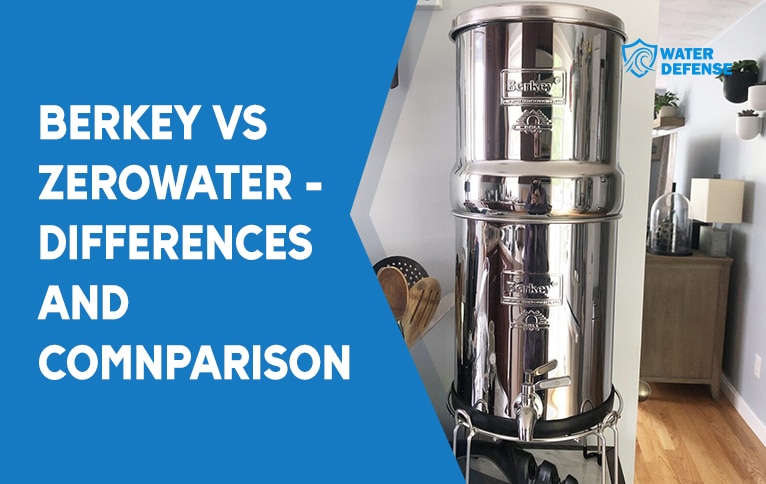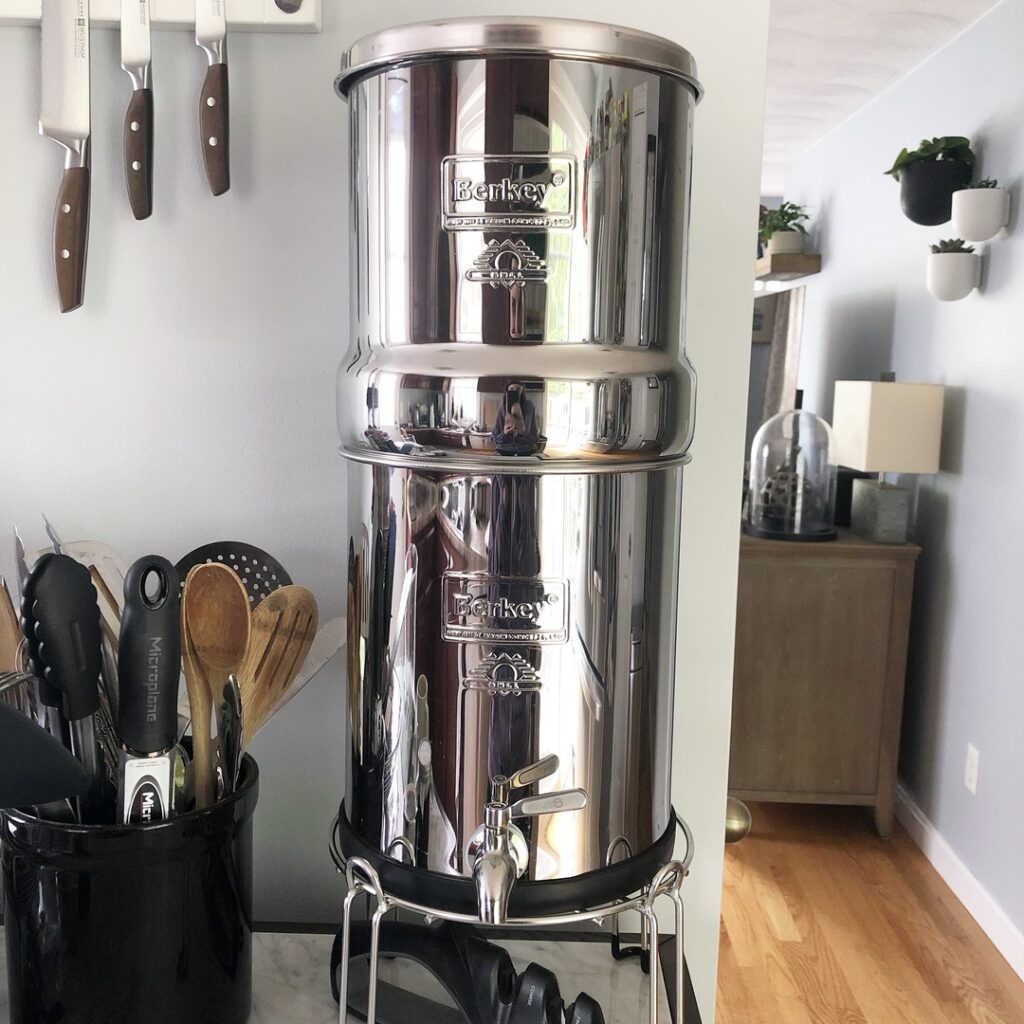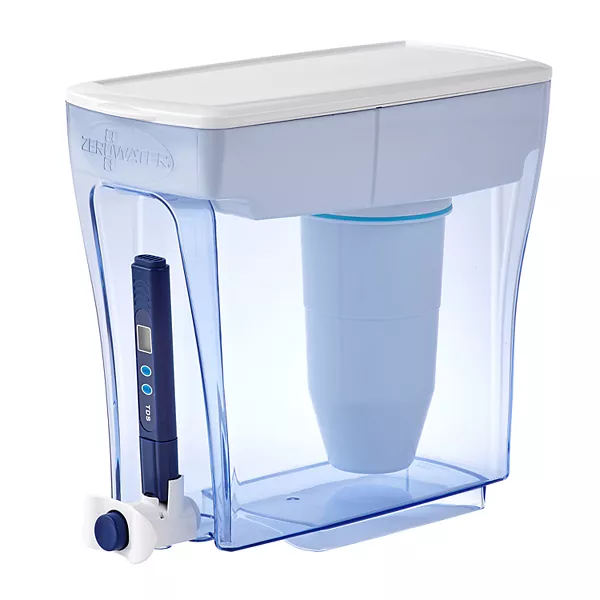If you’re looking for a water filtration unit, you’ll encounter lots of products that claim to be the right fit for you. You’ll also see the brand names Berkey and ZeroWater pop up again and again during your research.
The former is often recommended by experts, because of the brand’s innovative filtration technology. The latter is an excellent option for those on a budget and short on countertop space because the brand offers a variety of small water filtration items, such as pitchers and dispensers.

And overall, Berkey and ZeroWater products differ widely in almost all key features — in appearance, capacity, technology, lifespan, and focus.
So today, we’re going to give you an overview of what you can expect from both brands. Then, we’ll compare the brands’ most popular products so that you can evaluate which is the better fit for you.
Berkey Overview

When it was conceived in 1999 in Pueblo, Colorado, Berkey was only a small family business operating from a garage. However, the great care the brand showed in its customer relations and its investment in innovation was quickly rewarded.
Now, it has thousands of employees, dozens of warehouses across the United States, and a name that means something in the industry.
The brand has developed a proprietary and ground-breaking filtration technology called Black Berkey Elements, which is a two-cartridge gravity filtration setup. Although this setup takes up to an hour to filter 2.25 gallons of water, it has proven to be one of the most effective and robust technologies when it comes to water filtration.
This is largely thanks to:
- Absorbent media: Absorption, which refers to the process of attracting contaminant molecules by their electric charge and binding them, is not a novel technology — water softeners have been employing it for almost a whole century to neutralize hard water minerals such as calcium and magnesium, and heavy metals such as lead and arsenic. However, other brands have mostly utilized absorbent media as a single layer in their filter cartridges. In Black Berkey Elements, however, this media is spread across the cartridge, ensuring it doesn’t miss any contaminants with an electric charge. Additionally, while absorption typically removes essential minerals (calcium, magnesium, etc.), that’s not the case with the Black Berkey Elements.
- Adsorptive walls: Albeit less common than absorbent media, adsorptive media isn’t novel either. However, this technology isn’t used as filtration media in the Black Berkey Elements. Rather, the interior walls of the cartridges have an adsorptive charge that draws impurities by their electrostatic charge during the water’s entire journey through the cartridges.
- Unique media placement: Besides absorbent media and adsorptive walls, Berkey products also boast six different media placed in layers inside the cartridges. The company doesn’t disclose the specifics, but it’s public knowledge that these media are placed to create a “torturous path” for contaminants. It means that the design of the media is meant to create a labyrinth-like structure, which increases the contact time between media and water — if a contaminant particle misses one media layer, there’s a great chance it’ll still be caught by another.
Thanks to this cutting-edge approach to their design, Berkey units remove more than 200 contaminants with impressive reduction rates.
The Black Berkey Elements technology doesn’t have any National Sanitation Foundation certifications. But various independent labs have tested the filter against standards set by the National Sanitation Foundation (NSF) and the Environmental Protection Agency. These labs have provided seven different performance data sheets as scientific proof of the company’s claims.
A List of Berkey Water Filtration Products
Berkey only has countertop gravity filtration units and a shower filter in its catalog. While five of these countertop units have gray stainless steel, the lightweight Berkey option, Berkey Light, is made of BPA-free plastic and has a transparent look.
All Berkey countertop units come with a default two-cartridge Black Berkey Elements setup. But, depending on which model you choose, you can upgrade up to an eight-cartridge setup, prolonging the filter life and quickening the filtration process.
| Berkey products/Key specifications | Material | Cartridge capacity | Water capacity |
| Travel Berkey | Stainless steel w/ BPA-free plastic spigot | 2 Black Berkey filter cartridges | 1.5 gallons (1-2 people) |
| Big Berkey | Stainless steel w/ BPA- free plastic spigot | 4 Black Berkey filter cartridges | 2.25 gallons (3-4 people) |
| Berkey Light | BPA-free plastic | 4 Black Berkey filter cartridges | 2.75 gallons (3-5 people) |
| Royal Berkey | Stainless steel w/ BPA- free plastic spigot | 6 Black Berkey filter cartridges | 3.25 gallons (4-6 people) |
| Imperial Berkey | Stainless steel w/ BPA- free plastic spigot | 6 Black Berkey filter cartridges | 4.5 gallons (4-8 people) |
| Crown Berkey | Stainless steel w/ BPA- free plastic spigot | 8 Black Berkey filter cartridges | 6 gallons (up to 10 people) |
The Big Berkey is the customer favorite — it’s compact and its water capacity is ideal for an average-size American family, so it’s the product with the widest appeal.
ZeroWater Overview

ZeroWater has been on the water filtration market since 2002, producing compact water treatment items such as water filter pitchers, dispensers, and faucet-mount systems.
The company’s main focus is the reduction of total dissolved solids (TDS), meaning elements that have an ionic structure such as heavy metals and minerals. To that end, all ZeroWater products feature a built-in TDS count.
Additionally, the brand has developed its own proprietary technology, ZeroWater 5-stage filtration, to eliminate TDS. We don’t know the exact specifications of this technology, but it consists of a unique blend of activated carbon media and ion exchange properties.
While activated carbon reduces the levels of aesthetic nuisances, including chlorine, taste, odor, color, and sediment, ion exchange tackles TDS, minerals, and three heavy metals (lead, hexavalent chromium, and mercury). The filtration technology has two NSF certifications to support its claims:
- NSF/ANSI Standard 42 – for reduction of aesthetic nuisances
- NSF/ANSI Standard 53 – for reduction of the above-mentioned heavy metals
There’s a performance data sheet you can look at to learn more about its success in reducing these impurities. The data sheet also shows that the technology is effective against perfluorinated compounds (PFAS/PFOA).
A List of ZeroWater Products
Most products in the ZeroWater catalog come with the 5-stage filtration technology by default, but first, let’s get the ones that don’t employ this tech out of the way:
- Shower filters: ZeroWater sells shower filters manufactured by Culligan. These devices are designed to reduce the hardness of bath water, minimizing its negative effects on skin and hair.
- ExtremeLife Faucet Mount Filtration System: Despite not utilizing the 5-stage tech, the ZeroWater faucet system is good at reducing aesthetic nuisances and PFAS/PFOA levels. However, its real power lies in its filtration capacity. While most faucet systems’ filters last for 100-150 gallons, like Brita, ZeroWater ExtremeLife has a filter life of 400 gallons — or up to six months.
- EcoFilter: EcoFilter is the brand’s eco-friendly water filter pitcher option because of its filter life. While the brand’s other pitcher and dispenser models that have the 5-stage tech have a filter life of 40 gallons; the EcoFilter boasts 120 gallons, so it reduces waste. However, we should warn you, it reduces only aesthetic nuisances, and it’s only recommended for households where the TDS levels in the water is low.
The ZeroWater items that employ the 5-stage tech are:
- ZeroWater water filter dispensers: There are six different water filter dispensers in the brand’s catalog that only differ in change and water capacity: 12-cup, 20-cup, 22-cup, 30-cup, 32-cup, and 40-cup. The sale and review numbers show that the 30- and 40-cup options are the most popular picks.
- ZeroWater water filter pitchers: Besides EcoFilter, the brand has five water filter pitcher models: 6-cup, 7-cup, 8-cup, 10-cup, and 12-cup. Similar to the brand’s dispensers, these models vary only in size and appearance. The 10-cup model is the customers’ choice.
Big Berkey vs. ZeroWater 40-Cup Ready-Pour Glass 5-Stage Water Filter Dispenser
Big Berkey is Berkey’s flagship product because it combines compactness and affordability with a size suitable for the average family. The ZeroWater 40-cup dispenser, on the other hand, distinguishes itself from other dispensers with its modern and carafe-like look and huge water capacity.
Although both are countertop units, the specifics of these devices make them very different. Each employs its own filtration technology and, inevitably, the contaminants they target and their success rates at eliminating them also vary. Additionally, they’re vastly different in their filtration capacity.
All these differences affect the products’ prices and long-term costs.
Now, let’s see how these systems fare against each other and which one is the right fit for you.
Water Capacity, Size, and Appearance
Big Berkey has a 2.25 gallon of water capacity — enough to cover an entire day for the average family. The ZeroWater dispenser’s 40-cup water capacity equals 2.5 gallons. So, with ZeroWater you’ll have four more cups of clean water.
The size difference between the two devices isn’t much either. Big Berkey is 21 inches in height and 8.5 inches in diameter. The ZeroWater dispenser has a 19.8-inch height, 11-inch width, and 9.8-inch length. While the former weighs 7 lbs, the latter is 9.2 lbs.
The weight difference between the two is mostly due to the products’ material. Big Berkey’s main body is made of stainless steel, and the device has a plastic spigot.
This particular ZeroWater model, on the other hand, has a glass water container unit. Additionally, it has a stainless steel lid and bottom section, and a plastic spigot. As such, it has a more modern look when compared to the inconspicuous design of Big Berkey.
Filtration Technology and Contaminants Removed
In terms of filtration technology, Big Berkey’s Black Berkey Elements tech is far superior to the ZeroWater 40-Cup Dispenser’s 5-stage process. While the latter removes only lead, mercury, hexavalent chromium, and PFAS/PFOA in addition to aesthetic nuisances, the former removes more than 200 contaminants including the ones the ZeroWater 5-stage tech does.
| Contaminants | Black Berkey Elements reduction rate | Zerowater 5-stage reduction rate |
| Lead | 99.9% | 95.9% |
| Mercury | 99.9% | 96% |
| Hexavalent chromium | 99.9% | 99.6% |
| PFAS/PFOA | 99.8% | 94.9% |
| Chlorine | 99.9% | 97.5% |
Additionally, the Black Berkey Elements have better reduction rates for all the contaminants that the ZeroWater filter also targets. So, if you want to remove as many contaminants as possible with excellent success rates, Big Berkey is the evident choice.
Filtration Capacity and Maintenance Requirements
Black Berkey Elements come in a two-cartridge setup by default. This setup has a 3,000-gallon filtration capacity, which, depending on the usage, equals around two years of use without requiring replacement.
As Big Berkey has a four-cartridge capacity, you can upgrade and have a 6,000-gallon capacity, too — which can give you four years of not having to worry about filter replacements. These numbers are unprecedented in the industry.
ZeroWater’s 5-stage filters, on the other hand, only have a 40-gallon filter life. That equals a month or two of clean water. Considering that the device has a 2.5 gallon capacity, you can fill it only sixteen times before needing to replace its filter.
In that sense, Big Berkey’s superiority to the ZeroWater 40-cup dispenser is incontestable.
Warranty and Price
ZeroWater’s pitchers and dispensers come with a 90-day warranty. Considering Brita, the most popular pitcher/dispenser brand, offers at least a year of warranty on its products, the ZeroWater warranty falls far below the industry standards.
In contrast, Berkey is among the best in the industry when it comes to warranty. The brand has a lifetime warranty for all its products, including Big Berkey, which gives it the upper hand in this category.
That superiority might seem reversed when you look at the price tags of these products. Big Berkey’s initial price is $367, while the ZeroWater currently (by early August, 2023) costs $59.99. Additionally, while a two-cartridge Black Berkey Elements is $166, a two-pack of ZeroWater 5-stage filter is only $29.99.
However, considering Black Berkey Elements have a 24-times more filtration capacity than the ZeroWater 5-stage filter, it’s a better long-term investment.
Our Verdict
Big Berkey is undoubtedly the better choice thanks to its superior filtration technology, number of removed contaminants, reduction rates, extraordinary filtration capacity, lifetime warranty, and low long-term costs.
Comparison Table
| Key Attributes/Products | ZeroWater 40-Cup Dispenser | Big Berkey |
| Material | Glass, stainless steel, and BPA-free plastic | Stainless steel with a plastic spigot |
| Water capacity | 2.5 gallons | 2.25 gallons |
| Filtration technology | 5-stage ZeroWater filter w/ activated carbon media and ion exchange properties | Black Berkey Elements with microfiltration, absorption, adsorption, and prolonged contact time |
| Contaminants removed | Aesthetic nuisances, lead, mercury, hexavalent chromium, and PFAS/PFOA | 200+ contaminants |
| NSF certifications | NSF/ANSI Standards 42, AND 53 | Not certified |
| Filtration capacity (avg.) | 40 gallons / 1-2 months | 3,000 gallons / 2 years |
| Size | Length: 9.8 inches, Width: 11 inches, Height: 19.8 inches | Diameter: 8.5 inches, Height: 21 inches |
| Weight | 9.2 lbs | 7 lbs |
| Warranty | 90 days | Lifetime |
| Price | $59.99 | $367 |
| Replacement Filter Price | $29.99 (two-pack) | $166 |
Conclusion
While Berkey excels in countertop gravity filtration units, ZeroWater focuses on water filter pitchers and dispensers.
However, a detailed comparison of the most popular devices of the two brands makes it evident that Berkey is far superior to ZeroWater.
Berkey’s filtration tech, Black Berkey Elements, removes more than 200 contaminants with remarkable reduction rates. ZeroWater’s 5-stage tech is only effective against lead, mercury, hexavalent chromium, and aesthetic nuisances.
What’s even more impressive for Berkey is its filtration capacity. While a two-cartridge Black Berkey Elements setup lasts for 3,000 gallons, equalling about two years of use without replacement, ZeroWater has only a 40-gallon filter life.
Lastly, Berkey offers a lifetime warranty on its product. ZeroWater, on the other hand, has only 90 days of warranty, which is poor, to put it mildly. Our recommendation is to go with the Big Berkey — if you can afford to make the investment.